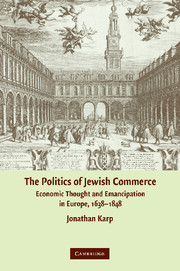Book contents
- Frontmatter
- Contents
- Acknowledgments
- Introduction
- 1 This Newfangled Age
- 2 From Ancient Constitution to Mosaic Republic
- 3 A New System of Civil and Commercial Government
- 4 The Natural Relation of Things
- 5 A State within a State
- 6 The Israelites and the Aristocracy
- 7 Jews, Commerce, and History
- 8 Capitalism and the Jews
- Afterword: Industrialization and Beyond
- Notes
- Bibliography
- Index
Afterword: Industrialization and Beyond
Published online by Cambridge University Press: 18 July 2009
- Frontmatter
- Contents
- Acknowledgments
- Introduction
- 1 This Newfangled Age
- 2 From Ancient Constitution to Mosaic Republic
- 3 A New System of Civil and Commercial Government
- 4 The Natural Relation of Things
- 5 A State within a State
- 6 The Israelites and the Aristocracy
- 7 Jews, Commerce, and History
- 8 Capitalism and the Jews
- Afterword: Industrialization and Beyond
- Notes
- Bibliography
- Index
Summary
The economic ideologies surveyed in this book were all formulated before the advent of the European Industrial Revolution. Because this was the watershed event of economic modernity, it will be worthwhile considering the legacy of the doctrines explored earlier to the industrial and postindustrial world. With the exception of the kinds of Jewish nationalist formulations associated with Zionist economic ideology, the period from 1638 to 1848 produced a comprehensive vocabulary of economic concepts, images, and arguments that would be reiterated, adapted, and deployed by later generations (although few were aware of the original sources). In the literature of this period, Jews had acquired contradictory identities: as an economically outmoded group or a nation of relentless modernizers; as part of the old order or the vanguard of the new; as a people gifted with commercial talents to fructify local economies or parasites draining the inherited order of its natural vitality; as emblems of slavery, exploitation, or of emancipation; as poor schnorrers or “kings of the age.”
In the middle and late nineteenth century, a Jewish population encumbered by these binary images confronted industrialization. It was a bizarre encounter. The Industrial Revolution appeared to profoundly transform everything but the Jews. How was it possible that “probably the most important event in world history” (Eric Hobsbawm) so little altered their core economic orientations?
Historians have become sensitive to the gradual, piecemeal, and variegated character of European industrialization (no longer seen exclusively through the lens of eighteenth-century Britain).
- Type
- Chapter
- Information
- The Politics of Jewish CommerceEconomic Thought and Emancipation in Europe, 1638–1848, pp. 264 - 270Publisher: Cambridge University PressPrint publication year: 2008



